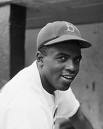
![]()
(1919-1972)
He broke the color barrier in 1947 when he became the first black major league baseball player. In spite of racial hostility and even death threats from players and fans, he played the game of baseball with quiet dignity and extraordinary talent. He was a daring base runner, an excellent fielder and held a career batting average of .311. He was an active spokesperson for civil rights, and in 1962 he became the first African-American elected to baseball’s Hall of Fame.
“There is not an American in this country that is free until every one of us is free.” – Jackie Robinson
“A life is not important except in the impact it has on other lives.” – Jackie Robinson
Break the Barrier
(By Jonathan Sprout & Dave Kinnoin)
I’ve got my bat. I’ve got my mitt.
I’ve got the skill. I’m physically fit.
What’s stopping me from walking on in?
There’s something here I cannot see --
A silent code about people like me.
I’m not welcome ‘cause of the color of my skin.
It shouldn’t have to be this way.
All I want is a chance to play.
REFRAIN: We gotta break the barrier
Break the barrier.
Come on everybody, one and all,
We gotta break that wall.
There is a fire in my soul.
Sometimes it’s hard to keep control.
I have a plan that’s gonna work out.
With every hit and stolen base,
With every catch, I’ll make my case.
Before I’m done, the fans will shout.
In this democracy,
Nobody’s free ’til we all are free!
REFRAIN
Jackie, you know how to play the game.
Baseball is never gonna be the same!
REFRAIN
© 2000 Kanukatunes (ASCAP) & Song Wizard Music (ASCAP)
In a newspaper article in The Times on December 19, 2009, author Gene A. Budig writes:
"Despite numberous death threats, Jackie and Rachel Robinson returned from baseball games at old Ebbets Field on the subway, talking with numerous people, young and old, black and white, about the day's events. The Robinsons had no security assigned to them.
The Hall of Fame second baseman of the old Brooklyn Dodgers and his wife were people of conviction who felt compelled to carry the message of civil rights a decade before Dr. Martin Luther King arrived on the scene. They were often embattled as they traveled to all corners of the United States and around the globe, advocating fairness, racial equity and opportunity for all people.
In a conversation with me, Rachel told me Jackie was 'never a victim, and neither was I.'
This remarkable woman thought they were fortunate to 'make a difference.' She never sought the spotlight but she never shied away from it when the common good was at stake. I believe she deserves her own place in American history."
Jackie Robinson was awarded the Congressional gold medal at the United States Capitol Building in Washington on March 2, 2005.· President George W. Bush made the presentation to members of Robinson’s family, including his wife Rachel, daughter Sharon and grandson David.· “Jackie’s is an amazing story,” baseball commissioner Bud Selig said. “This kind of recognition outside of baseball is long overdue.”
Robinson was just the second baseball player and fourth professional athlete to receive the prestigious honor, joining Hall of Fame outfielder Roberto Clemente (1973), former heavyweight boxing champion Joe Louis (1982) and Olympic track and field star Jesse Owens (1988).
Since the American Revolution, the U.S. Congress has commissioned gold medals as its highest expression of national appreciation for distinguished achievements and contributions.
In 1997, on the occasion of the 50th anniversary of Robinson’s historic entrance into major league baseball, his uniform No. 42 was retired throughout the major leagues.
The story of Jackie Robinson would·not be complete without mentioning Branch Rickey, president and general manager of the Brooklyn Dodgers. Branch, who wanted to break the color barrier in major league baseball by including blacks players, approached Jackie and warned him that it would be tough being the first black to do this. He warned Jackie there would be times when he would want to fight back, but that he must not do this. Robinson said, “Mr. Rickey, are you looking for a Negro who’s afraid to fight back?” Rickey replied, “I’m looking for a ballplayer, Jackie, with guts enough not to fight back.”
Jackie Robinson, with Branch Rickey’s support, went on to show the world that he could not only play baseball as well as the rest of them, but that he could also be a bigger person, not to fight back when people treated him with disrespect.
Tolerance means respecting and accepting another for who or what s/he is. Mr. Robinson showed by example that he was more responsible, a bigger person, more tolerant than those who treated him poorly. To be tolerant means having “the capacity to endure, especially hardship and pain.” He was patient.
Jackie knew and sometimes worked side by side with one of my other heroes, Dr. Martin Luther King, Jr. Like Dr. King, Jackie Robinson also did not respond with violence to the violent threats he received. He was proactive, not reactive. Had he responded with anger and reprisals to the accusations that he was not good enough to play because his skin was not white, he would have forfeited his dignity as a tolerant, talented responsible man.
Jackie Robinson was a Bully Buster -- he ignored the threats and bad words and things that were hurled at him.
Distancing yourself from someone can hurt that person. It was painful to Mr. Robinson that he was treated as different, but he was a hero not to resort to violence and, instead, to “strike back” with hits and stolen bases. He used his hands to play the best baseball he could, not to hit people.
I went to Cooperstown, NY, home of the baseball hall of fame, to research Mr. Robinson. Cooperstown is a welcoming little town adorned with baseball related museums and shops. It’s a fun destination for people who have a passion for baseball.
The Jackie Robinson Foundation is a wonderful organization that gives college scholarships to underprivileged African Americans who are then required to give back so that others may also have the opportunity to enjoy the gifts of the foundation.
Jackie Robinson was also a movie star! He starred in a movie about himself, called The Jackie Robinson Story. The movie was released in 1951 and is still available to buy. Actress Ruby Dee played Rachel, his wife. I own a copy of the movie. It’s fascinating to watch Mr. Robinson acting out his own real life story.
Links:
National Baseball Hall of Fame Museum in Cooperstown, NY
Jackie Robinson Foundation (continues the legacy of Jackie Robinson by providing college scholarships for minority youths)
Jackie Robinson Timeline by Scholastic


